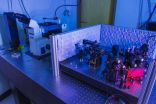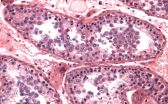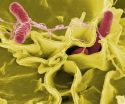Implantable 'artificial pancreas' could help diabetes patients control their blood sugar
2015-07-01
(Press-News.org) Living with Type 1 diabetes requires constant monitoring of blood sugar levels and injecting insulin daily. Now scientists are reporting in the ACS journal Industrial & Engineering Chemistry Research the development of an implantable "artificial pancreas" that continuously measures a person's blood sugar, or glucose, level and can automatically release insulin as needed.
Type 1 diabetes, previously known as juvenile diabetes, affects about 1.25 million Americans. About 200,000 of them are under 20 years old. The condition arises when a person's own immune system destroys the pancreas cells that make insulin, the hormone that converts blood sugar into energy. To make up for this loss of insulin production, patients must take insulin daily. Current delivery methods involve multiple daily injections or insulin pump therapy, both requiring the user to actively track glucose and calculate the needed insulin dose. There is also a significant time lag between when a dose is needed and when it can take effect. Francis J. Doyle III and colleagues wanted to find a way to make monitoring and insulin delivery automatic and needle-free.
The researchers designed an algorithm that monitors blood sugar levels and computes an insulin dose that it delivers quickly and automatically when necessary. The algorithm is designed to work with implanted devices, specifically with an artificial pancreas, and would overcome the delays experienced with current devices. Computer testing of the algorithm simulated the rise and fall of glucose that would correspond to meals and an overnight period of sleep. The artificial pancreas maintained blood glucose within the target range nearly 80 percent of the time. The researchers say they will soon test the device in animals.
INFORMATION:
The authors acknowledge funding from the National Science Foundation and the National Institutes of Health.
The American Chemical Society is a nonprofit organization chartered by the U.S. Congress. With more than 158,000 members, ACS is the world's largest scientific society and a global leader in providing access to chemistry-related research through its multiple databases, peer-reviewed journals and scientific conferences. Its main offices are in Washington, D.C., and Columbus, Ohio.
To automatically receive news releases from the American Chemical Society, contact newsroom@acs.org.
Follow us: Twitter Facebook
ELSE PRESS RELEASES FROM THIS DATE:
2015-07-01
MOOCs -- massive open online courses -- grant huge numbers of people access to world-class educational resources, but they also suffer high rates of attrition.
To some degree, that's inevitable: Many people who enroll in MOOCs may have no interest in doing homework, but simply plan to listen to video lectures in their spare time.
Others, however, may begin courses with the firm intention of completing them but get derailed by life's other demands. Identifying those people before they drop out and providing them with extra help could make their MOOC participation much ...
2015-07-01
The production of petroleum from Canada's oil sands is on the rise with much of it destined for U.S. refineries. As the U.S. takes stock of its greenhouse gas emissions, scientists report in the ACS journal Environmental Science & Technology that the current oil sands production of fuels from "well-to-wheels" releases about 20 percent more carbon dioxide into the atmosphere than making gasoline and diesel from conventional crudes.
In 2013, the oil industry was producing nearly 2 million barrels per day from Canadian oil sands. By 2030, that number is expected to rise ...
2015-07-01
JILA researchers have designed a microscope instrument so stable that it can accurately measure the 3D movement of individual molecules over many hours--hundreds of times longer than the current limit measured in seconds.*
The technology was designed to track the machinery of biological cells, down to the tiniest bits of DNA, a single "base pair" of nucleotides among the 3 billion of these chemical units in human genes. But the instrument could be useful well beyond biology, biochemistry and biophysics, perhaps in manufacturing.
JILA is a partnership of the National ...
2015-07-01
GRAND RAPIDS, Mich., June 24, 2015 - Researchers at Spectrum Health Helen DeVos Children's Hospital have completed the first clinical trial of a new treatment for children suffering from neuroblastoma. In a clinical trial led by Giselle Sholler, MD, pediatric oncologist at Helen DeVos Children's Hospital and the Neuroblastoma and Medulloblastoma Translational Research Consortium (NMTRC), DFMO, an investigational agent, showed minimal side effects with long-term survival of three patients. This is the first clinical study of an oral dosing form of DFMO in any pediatric population. ...
2015-07-01
Scientists have at their disposal a way to explore the possible prevention of genetic diseases before birth. But should they? Currently, the most promising path forward involves editing the genes of human embryos, a procedure rife with controversy. An article in Chemical & Engineering News (C&EN), the weekly newsmagazine of the American Chemical Society, parses the explosive issue.
Britt E. Erickson, a senior editor at C&EN, reports that at least one team of scientists has already published a study on altering disease-related genes of human embryos. The experiment was ...
2015-07-01
In the most severe form of male infertility, men do not make any measurable levels of sperm. This condition, called azoospermia, affects approximately 1 percent of the male population and is responsible for about a sixth of cases of male infertility.
Oftentimes men with azoospermia don't know the underlying cause of their condition. But new research led by University of Pennsylvania scientists suggests that mutations in an X chromosome gene called TEX11 are responsible for a significant number of cases of infertility -- an estimated 1 percent of cases of non-obstructive ...
2015-07-01
Complex magnetic structures are at the heart of promising new materials for devices in "spintronics", a field of research aiming at more energy efficient data storage and processing. A prominent example is the so-called spin valve, where the magnitude of the electrical current passing through a device is very sensitively dependent on its magnetic configuration. These configurations can be readily controlled by a magnetic field in artificial layer systems, resulting in the giant magnetoresistance effect (GMR), a discovery rewarded with the 2007 Noble price in physics to ...
2015-07-01
College Park, Md. -- Extreme heat and precipitation events, which are expected to increase in frequency and intensity due to climate change, are associated with increased risk of Salmonella infections, according to a study led by researchers from the University of Maryland School of Public Health. The study is the first to provide empirical evidence that Salmonella infections related to extreme weather events are disproportionately impacting those living in the coastal areas of Maryland.
"We found that extremely hot days and periods of extreme rainfall are contributing ...
2015-07-01
When ecologists gather in Baltimore, Md., this August for the 100th Annual Meeting of the Ecological Society of America, special attention will fall on the local Chesapeake Bay watershed, with field trips and research presentations exploring its rich wildlife and social history. At symposia, poster exhibits, and site visits, ecologists will have opportunities to discuss the latest research and experiences working with stakeholders in the region to improve the health of the nation's largest estuary.
Chesapeake Bay bears a heavy pollution burden from the growing metropolitan ...
2015-07-01
PHILADELPHIA - Despite findings of previous studies and published guidelines, nearly two-thirds of patients with T4a larynx ("voice box") cancer are not receiving a total laryngectomy (surgical removal of the larynx), the recommended form of treatment, and as a result, have significantly worse survival rates versus those treated with a total laryngectomy, a new study published in the International Journal of Radiation Oncology, Biology and Physics by experts at Penn Medicine found. Patients who underwent a laryngectomy, on average, lived nearly two years longer than those ...
LAST 30 PRESS RELEASES:
[Press-News.org] Implantable 'artificial pancreas' could help diabetes patients control their blood sugar


